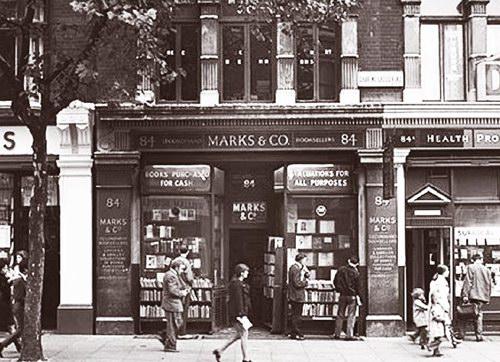“84 Charing Cross Road” Revisited 重访查令十字街84号
2016-05-14ByMonicaPorter赵云舒/选黄湘淇/注
By Monica Porter 赵云舒/选 黄湘淇/注



In June, 1971, a slim volume by a little-known,1 middle-aged American writer, Helene Hanff, was published in Britain. Called 84 Charing Cross Road, it was a most unlikely bestseller—simply a collection of letters between the impecunious book-lover Hanff, in New York, and the staff of Marks & Co, an antiquarian bookshop in London.2
The correspondence spanned two decades—from Britains post-war austerity to the height of the Swinging Sixties—and was full of warmth, humour and humanity.3 If our notion of the “special relationship” between Britain and America means anything at all, it is embodied in the pages of Hanffs little book.4
It all began in October 1949 as a straightforward5 business correspondence. Having seen an advert for Marks & Co, describing them as specialists in out-of-print books, Hanff wrote to them with a wish list of titles shed been unable to acquire in New York.6 “I am a poor writer with an antiquarian taste in books,” she explained. “If you have clean second-hand copies of any of the books on the list, for no more than $5 each, will you consider this a purchase order and send them to me?”7
The order was dealt with by the shops manager, Frank Doel, who sent her some of the items she wanted and promised to look out for the others. He addressed8 his letter “Dear Madam” and signed it “Yours faithfully, FPD”. All very formal, very British. But it wouldnt stay that way for long. Hanffs next letter enclosed payment, praised the “soft vellum and cream-coloured pages” of the books, which put to shame her “orange-crate bookshelves”, and ended with a PS:9 “I hope ‘madam doesnt mean over there what it means over here.” She had an insatiable hunger for the classic works of English literature—Jane Austen, John Donne, Chaucer, Samuel Pepys.10 She sent the shop further orders and more books were dispatched to her Manhattan bedsit.11 Then in December she had a surprise for Marks & Co.
Having heard about the food rationing in effect in Britain, Hanff sent the staff “a small Christmas present” of foodstuffs most Brits hadnt seen for years, including a large ham.12
This was hastily followed by a short note: “I just noticed on your last invoice it says ‘B. Marks, M. Cohen. Proprietors. ARE THEY KOSHER? I could rush a tongue over. ADVISE PLEASE!”13
In Charing Cross Road, “FPD” and his staff were deeply moved by this gesture14 from a woman they had never met, 3,500 miles away. At Easter she delighted them again, with a parcel containing real eggs—their first in many years of making do with the powdered variety.15 And so began a more personal, more affectionate transatlantic relationship.16 Soon Hanff was exchanging letters not only with Doel, but with his kindly Irish wife, Nora, as well as the rest of the team at Marks & Co.
Disarmed by her quirky, engaging jocularity, the letters from the businesslike Doel grew less formal,17 although it wasnt until 1952 that he finally addressed her as “Dear Helene”. For her, he became “Frankie”: “Now listen Frankie, its going to be a long cold winter and I babysit in the evenings and I need reading matter. Dont sit around, go find me some books!”
Hanff longed to visit London, to “see the England of English literature”.18 But, as the years passed, she could never afford to make the trip. Single and childless, she lived a hand-to-mouth existence as a writer of childrens history books, television scripts and magazine articles, and regarded herself essentially as a failed playwright.19 Her first proper book, in 1961, was Underfoot in Show Business, an account of how she had failed to “crash the theatre” with her string of unproduced plays.20
The long-running correspondence with “her bookshop”, and especially with Frank Doel, gave her a treasured bond with the city she seemed destined never to see.21 When, in January 1969, she received a letter from Marks & Co informing her that Doel had died of peritonitis following a ruptured appendix, she was devastated.22 The bond was lost.
To a friend embarking on a trip to London that spring, she wrote: “The blessed man who sold me all my books died a few months ago.23 But Marks & Co is still there. If you happen to pass by 84 Charing Cross Road, kiss it for me! I owe it so much.” The epistolary book chronicling her relationship with the shop was born out of her deep sense of loss.24 Published in the US in 1970, it was an instant success. Unexpectedly, Hanff was catapulted out of obscurity to be feted in the media as a new literary celebrity.25 Fan letters poured in to her tiny apartment on East 72nd Street.
In Britain the book was acquired by André Deutsch and published the following June and that month Hanff at long last stepped off a plane at Heathrow to enjoy five weeks in the city of her dreams.26 Her only sadness was that Marks & Co had recently closed down. She made a pilgrimage to the empty, dusty shop and visited the now-widowed Nora at home.27
“She told me how furious28 she used to be when he brought one of my letters home to read to the family,” Hanff wrote in 1973. “‘Id say to him, what kind of husband are you, to bring another womans letters home! ‘If he hadnt brought them home, I said, ‘youd have had cause to29 worry. She looked at me and nodded. ‘Thats just what Frank used to say.”
The enthusiastically reviewed 84 Charing Cross Road was even more of a hit30 here than in the US. It won Hanff a huge British fan base and, in the following years, turned into a phenomenon.31 In 1975 it was adapted for32 television by the BBC. Then in 1981 James Roose-Evanss award-winning stage version was a West End hit which ran for 16 months.33
Hanff really hit the jackpot34 a few years later, when Hollywood came calling. Producer Mel Brooks acquired the property as a star vehicle for his wife, Anne Bancroft.35 Doel would be played by Anthony Hopkins36. Could things get any better?
It was at this point that our paths crossed. One day in a local library in 1981, I came upon37 84 Charing Cross Road. I was so moved by it that I sent Hanff a letter, explaining that I was a fellow writer and asking whether we might meet. Before long we fixed a date38.
We met at Rumpelmayers, an elegant old café on Central Park South. In her gravelly, smokers voice she regaled me with anecdotes about New York life, and I relished her acerbic wit and self-deprecating humour.39 I was in my mid-thirties, she was nearing 70, I had a family, she was alone and fiercely40 independent. I was at a low ebb41 in my career, she was at the height of hers. Yet, opposites though we were, we shared some common threads42 in our lives.
When I told her about my stagnating career and fear that time was passing me by, she empathised because she had been through the same thing, at exactly the same age.43 She described how, when she was 34, she woke up in a sweat one night at the terrifying thought that she still hadnt had a play on Broadway.
When I complained about how remote and unhelpful literary agents were, she snorted in agreement.44 Her own agent, she said, wouldnt take her calls for years as she wasnt considered “big enough”. Even after 84 became a bestseller the agent remained elusive45.
When her book Qs Legacy—about the influence on her of the literary critic Sir Arthur Quiller-Couch—came out in 1985,46 naturally I read it with interest. I arranged to call on her at home one day, so she could sign my copy. Her inscription47 reads: “For Monica Porter—a young fellow writer—in the hope that shell live to write far better books than this one.”
We lost touch, eventually. Then one day in April 1997 I opened the paper to find her obituary48. Shed had diabetes for many years and died as a result of complications a week short of her 80th birthday.49 Sadly, all the fame and accolades bestowed on her over the years had not given her financial security.50 By her own account she was broke in her final years, and accepted a grant from an authors charity to help with hospital bills.51
Even when she had money, Hanff had given it away. Sheila Wheeler, Doels daughter, who lives in Muswell Hill, north London, tells me the writer made sure they received a share of her royalties52 following Franks death. “We saw her as an American fairy godmother when I was growing up,” she says. “I pictured her as someone tremendously rich and glamorous, looking like Lauren Bacall.53 It was a shock, when I finally met her in 1971, to see how wrong I had been.”
84 Charing Cross Road is today in print as a Virago Modern Classic54—kept alive for a new generation. The self-effacing Helene would doubtless be astounded that her little 84 is now considered a classic.55 I can just picture that look of incredulity, and hear that throaty laugh.56
1. slim: 薄的;volume: 书。
2. 这本书叫《查令十字街84号》,是最不可思议的畅销书——仅仅是纽约一个不名一文的书迷汉芙和伦敦一家旧书店——马克斯与科恩书店的店员之间的书信集。impecunious: 不名一文的;antiquarian: 古文物研究的。
3. correspondence: 通信;span: 跨越;post-war: 战后的;austerity: 紧缩,严峻;height: 高度,顶点;the Swinging Sixties: 摇摆60年代,是指20世纪60年代以伦敦为中心的时尚和文化风潮,由年轻人主导,强调战后紧缩后的乐观主义和享乐主义;humanity: 人性。
4. notion: 观念,看法;be embodied in: 体现在,呈现在。
5. straightforward: 坦率的,明确的。
6. 汉芙看到了马克斯与科恩书店的广告,上面声称他们专营绝版书,于是她给他们写了一份愿望书单,都是她在纽约无法找到的书籍。advert: 广告;specialist: 专家;out-of-print: 绝版的;wish list: 心愿单。
7. second-hand: 二手的;purchase order: 采购单。
8. address: (在信封、包裹等上)书写(收件人姓名、地址)。
9. enclose: 附上;vellum: 牛皮纸,上等皮纸;cream-coloured: 淡黄色的,米色的;put to shame: 使蒙羞,使自愧不如;orange-crate: 橙色板条箱;bookshelf: 书架;PS: 附言,补充说明,postscript的缩写。
10. insatiable: 永不满足的;hunger: 渴求;Jane Austen: 简·奥斯汀(1775—1817),英国小说家,代表作有《傲慢与偏见》、《理智与情感》等;John Donne: 约翰·邓恩(1572—1631),英国玄学派诗人,代表作品有《歌与十四行诗》、《突发事件的祷告》等;Chaucer: 乔叟(1343—1400),英国文学之父,被公认为中世纪最伟大的英国诗人,代表作品有《坎特伯雷故事集》; Samuel Pepys: 塞缪尔·佩皮斯(1633—1703),17世纪英国作家和政治家,以散文和流传后世的日记而闻名。
11. dispatch to: 发送;Manhattan: 曼哈顿,纽约市中心区;bedsit: 卧室兼起居室。
12. food rationing: 食物定量配给;in effect: 生效;foodstuff: 食品;ham: 火腿。
13. hastily: 匆忙地,草草地;invoice: 发票; proprietor: 所有者,业主;kosher: 犹太洁食,符合教规的清真食品;I could rush a tongue over: 我可以加急送一条牛舌过去。因为Hanff发现了发票落款处的Cohen,这是常用的犹太名,而犹太人不吃(猪肉)火腿,所以她才说如果他们不吃火腿,她可以寄犹太洁食过去,比如牛舌。
14. gesture: 举动。
15. Easter: 复活节,一年一度纪念“耶稣复活”的节日,一般在每年春分月圆之后的第一个星期日;parcel: 包裹;make do with: 设法应付,勉强对付;powdered variety: 各种打成粉的食品。
16. affectionate: 充满深情的;transatlantic: 横渡大西洋的。
17. be disarmed by: 被……解下心防; quirky: 古怪的;engaging: 动人的,迷人的;jocularity: 幽默,诙谐的言行; businesslike: 事务性的。
18. 汉芙渴望去趟伦敦,“看看英国文学所描述的英国”。long to do: 渴望做。
19. 单身无嗣的她是一位写儿童历史书、电视剧本和杂志文章的作家,生活贫困潦倒,她觉得自己实际上是个失败的剧作家。hand-to-mouth existence: 仅能糊口度日,勉强维持生计;television script: 电视剧本;essentially: 基本上; playwright: 剧作家。
20. proper: 真正的,正经的;underfoot 在脚下,被践踏地;account: 叙述;crash the theatre: 闯荡剧院;(a) string of: 一系列的;unproduced: 未上演的。
21. long-running: 持续很长时间的;treasured: 珍贵的;bond: 纽带;destined: 注定的。
22. peritonitis: 腹膜炎;ruptured appendix: 阑尾破裂;devastated: 十分震惊的,伤心欲绝的。
23. embark on: 开始;blessed: 神佑的。
24. epistolary: 书信体的;chronicle: 记录。
25. unexpectedly: 出乎意料地,意外地;be catapulted out of obscurity: 从默默无闻到暴得大名,catapult意为“把……弹出去”,obscurity意为“无名,默默无闻”; be feted as: 被誉为;literary celebrity: 文学名人。
26. 在英国,书的版权被安德烈出版社获得,并于同年六月出版,当月,汉芙最终在希思罗机场下了飞机,开始享受在这座她梦寐以求的城市的五周之旅。at long last: 最终,总算;Heathrow: 希思罗机场(位于英国伦敦)。
27. pilgrimage: 拜谒,(到某重要的地点或人物居所的)参观;dusty: 落满灰尘的;now-widowed: 如今寡居的。
28. furious: 怒不可遏的。
29. have cause to do: 完全有理由去做……。
30. hit: 极受欢迎的物(或人)。
31. fan base: 粉丝群;phenomenon: 非凡的事物,奇迹。
32. be adapted for: 被改编为。
33. James Roose-Evans: 詹姆斯·鲁斯-埃文斯(1972— ),英国剧作家;award-winning: 获奖的;stage version: 舞台剧版本;West End: 伦敦西区,是与纽约百老汇(Broadway)齐名的世界两大戏剧中心之一,是表演艺术的国际舞台,也是英国戏剧界的代名词。
34. hit the jackpot: 中大奖。
35. producer: 制片人;property: 所有权;star vehicle: 造星工具;Anne Bancroft: 安妮·班克罗夫特(1931—2005),美国演员,其作品《毕业生》蜚声世界影坛,是奥斯卡最佳女主角得主之一。
36. Anthony Hopkins: 安东尼·霍普金斯(1937— )英国著名戏剧和影视演员,因出演《沉默的羔羊》荣获64届奥斯卡(1992年)最佳男演员奖。
37. come upon: 遇到。
38. fix a date: 定下了会面。
39. 以其沙哑的烟熏嗓音,她与我分享了纽约生活的趣事,我欣赏她尖刻的机智和自嘲的幽默感。gravelly: 声音低沉沙哑的;smokers voice: 烟熏嗓;regale sb. with: 使人享受,以……款待某人;anecdote: 趣事;relish: 享受;acerbic: 尖刻的;wit: 机智;self-deprecating: 自嘲的。
40. fiercely: 极其,非常。
41. at a low ebb: 在低潮,在低谷。
42. common thread: 相同的思路。
43. 当我告诉她我一蹶不振的事业,担心自己荒废时日时,她感同身受,因为她恰恰也在同样的年纪时有着一样的经历。stagnating: 停滞的;empathise: 同情。
44. remote: 冷淡的;literary agent: 作家代理人; snort: 轻蔑或愤怒地发出哼声。
45. elusive: 逃避的,闪避的。
46. Qs Legacy : 传记作品《Q的遗产》;literary critic: 文学评论家;Sir Arthur Quiller-Couch: 阿瑟·奎勒-库奇爵士(1863—1944),英国小说家、评论家。
47. inscription: 题词。
48. obituary: 讣告。
49. diabetes: 糖尿病;complications: 并发症。
50. accolade: 赞美,荣誉;bestow on: 授予;financial security: 经济上的保障。
51. by ones own account: 据某人自己说;broke: 一贫如洗的;grant: 拨款;charity: 慈善团体。
52. royalty: 版税。
53. fairy godmother: 仙女教母;tremendously: 惊人地,极其地;glamorous: 迷人的,富有魅力的;Lauren Bacall: 劳伦·白考尔(1924—2014),美国女演员。
54. Virago Modern Classic: 是为了颂扬女性作家而对其作品进行再出版的一系列书。
55. self-effacing: 谦逊的,不出风头的;doubtless: 毫无疑问地;astounded: 感到吃惊的。
56. incredulity: 怀疑,不轻信;throaty: 低沉的,沙哑的。
